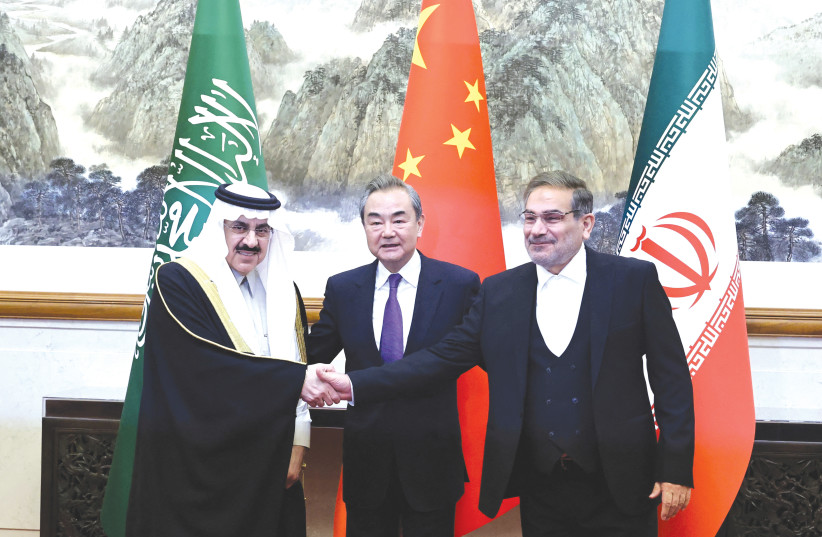The Saudis’ deal with Iran will not block potential Israeli normalization with Riyadh, former Mossad director Yossi Cohen said Sunday.
Israeli normalization with Saudi Arabia “is needed and is possible,” he said at an Institute for National Security Studies (INSS) conference related to the issue.
The most recent former Mossad chief gave the audience an unusual personal insight into how Saudi Crown Prince Mohammad Bin Salman (MBS) thinks.
Although Cohen, in making his prediction, said he could not confirm he has met with MBS (even though the Israeli censor as of 2022 finally allowed Israeli media to publish that such meetings have occurred), he gave an unequivocal analysis of what MBS wants.
MBS lost patience with the US, not insulting Israel
MBS was not insulting Israel with his deal with the Islamic Republic and China, but rather, he was telegraphing to the US that he had lost patience with its harsh treatment of him, and that the Saudis “had alternatives” besides America, Cohen said.

This came after US President Joe Biden had called MBS a “pariah,” had tried (and failed) to isolate MBS from making policy and had threatened to end the special relations with Riyadh after MBS in October 2022 did not act as Biden wanted relating to oil prices.
Rather than essentially freaking out about MBS’s deal with Iran and jumping to wrong conclusions about the motivations for the deal, Cohen said it was critical to “put yourselves in the shoes of the Saudis” and not that he thought an Israeli-Saudi normalization arrangement was immediate.
"They [Saudi-Arabia] need to always check the temperature about whether the Muslim world will forgive them."
Yossi Cohen
The Saudis would move forward with Israel slowly and carefully, since as the keepers of Islam’s holiest sites, “they need to always check the temperature about whether the Muslim world will forgive them” for jumping forward with Israel, he said.
Next, Cohen said, “There are still some big questions we need to cope with,” including the Russia-Ukraine war.
Essentially, just as that war could go on indefinitely if no honest broker comes forward to seal a ceasefire, the same inertia could unnecessarily drag out how long it takes for the Jewish state and Riyadh to reach a deal, he said.
On the positive side, within Israel and Saudi Arabia, “there are courageous leaders on both sides who know how to get to normalization,” Cohen said.
As Mossad chief, Cohen was intimately involved in a variety of channels relating to formulating and nailing down the Abraham Accords of 2020.
Foreign Ministry Director-General Ronen Levy
Foreign Ministry Director-General Ronen Levy, who was also deeply involved in the Abraham Accords – with some giving him primary credit for the deals with Sudan and Morocco – also expressed a certain level of optimism regarding relations with the Saudis.
The US was investing real energy in the normalization wave, he said at the conference.
Interestingly, Levy said Israel should “not forget other states at the same time that we can accomplish [deals with] before the Saudis. They are no less important.”
“I hope in the future months, we will update the map,” which was laid out behind him and listed countries with whom Israel has already normalized, he said.
Next, Levy said the previous three very successful deals that have reaped economic investment, tourism and other rewards for the United Arab Emirates, Bahrain and Morocco are great “engines” to move forward other “positive trends” in other potential Muslim states with which Israel would also like to normalize relations.
In addition, he referenced a new country in Africa whose representatives he recently met with in a European country to try to advance relations.
INSS Managing Director Tamir Hayman concurred with the other speakers that “the Iran-Saudi deal did not block normalization” for Israel and the Saudis.
“Look at the UAE example,” he said. “They restarted relations with Iran, exchanged ambassadors and took great pictures,” but “nothing bad happened to Israel’s deal with them. Our deal with the UAE just got better.”
“Maybe they were even more flexible with Israel,” he added, since the UAE was less worried about military punishment from Iran for its relations with Jerusalem.
Despite those positive points, Hayman said there were two obstacles, and they were “with the US and with the Palestinians.”
“As long as the [Saudi] king lives, it is a question of honor for him and for MBS to his father. He cannot do a [full] deal when he promised he would fix the Palestinian issue,” unless there is some major progress between Israel and the Palestinians. He made it clear that the US would hold a similar view.
Further, Hayman asked, “Will the next generation drop it [the Palestinian issue] completely? I don’t think so.” Even once MBS becomes king, he will require significant rewards for the Palestinians before he would normalize ties with Israel, he said.
On the positive side, Hayman said, “The Saudis and the Gulf see the détente trends in the region, and maybe we can use this to get new ideas and to achieve big changes with the Palestinians.”
